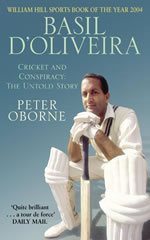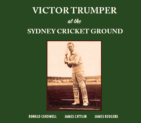Basil D’Oliveira: Cricket and Controversy
Archie Mac |Published: 2004
Pages: 274
Author: Oborne, Peter
Publisher: Little, Brown
Rating: 4.5 stars

I have put off reading this book, mainly because I have read so many accounts of The D’Oliveira Affair I believed the learning curve would almost resemble a flat line after a heart attack.
The introduction did little to inspire me, as the author informed that this was really a book of two parts; the first cricket, and the second more of a political nature. I had experienced this style with two previous cricketing biographies – from two very talented writers in Learie Constantine by Gerald Howat and Ranji by Alan Ross. The first half – the cricket part – of both these books I really enjoyed. The second half – political – I learned something new, but found both to be a ‘hard slog’.
But I’m happy to say the second half of this book was even better than the first. And that is saying something as the first half was just about as good as it gets for cricket book literature.
There was some really inspiring thought-provoking reading. Here is a sample of the writing:
‘The D’Oliveira story is not really about cricket at all. It is about sheer guts and bloody-minded resilience. It is a parable for anyone who is downhearted or at the bottom of the heap and can’t see the way out. It teaches that you must never stop trying, and trying and trying again. And then trying a bit more. It shows that however grotesque the injustice, there is the chance of fairness’.
For those unfamiliar with the Basil D’Oliveira story, here’s a brief account.
Basil D’Oliveira was brought up a black man in apartheid South Africa (with all that such a background entails). After achieving all there was in black South African cricket, D’Oliveira decided to try his luck in English league cricket – this he achieved with the help of many people including John Arlott. From the leagues to county to Test cricket, Basil D’Oliveira excelled until his dream of being selected for England to tour South Africa was almost a reality.
After a great century against Australia he looked certain to make the tour but was left out. A 12th hour reprieve saw him included only for the South African government to refuse him entry into the country, the tour was cancelled and South Africa was eventually ostracised from world cricket.
It has always been my belief that the South African cricket board (SACA) was unfairly linked with the South African apartheid government, and that they (SACA) were more then happy, and in fact encouraged the playing of mixed race Cricket, but were hamstrung by a racist government.
Well I feel a little naive – in fact foolish. After reading Oborne’s book, it becomes obvious that SACA were not only a racist organization but were in fact duplicitious in their behind-the-scene dealings, with not only the D’Oliveira affair but with all matters pertaining to integrated cricket.
Not too many people or organizations come out with their reputations enhanced by the end of the book, from the obvious SACA and the South African government to the MCC. Some legends of the game do not escape a blast from the Oborne pen including Gubby Allen, Jim Swanton and Colin Cowdrey.
One person who does come out with his reputation enhanced is John Arlott. He not only despised the treatment of black South Africans (he refused to visit or to cover tours played there) but also went out of his way to help Basil D’Oliveira play professional cricket in England.
This is a great biography – not just a great cricket biography but also a great read by a talented writer. This book is not aimed at just the cricket enthusiast, but a much larger audience. This is apparent by Peter Oborne’s explanations to the reader of cricket’s little customs, such as what constitutes a first-class match, and what a ‘benefit’ is.
I would be very surprised if Peter Oborne is not a cricket fan or at the very least has been brought up in a cricket environment. I have my doubts whether Oborne will write another cricket book; if he does I can guarantee him at least one sale.






Leave a comment